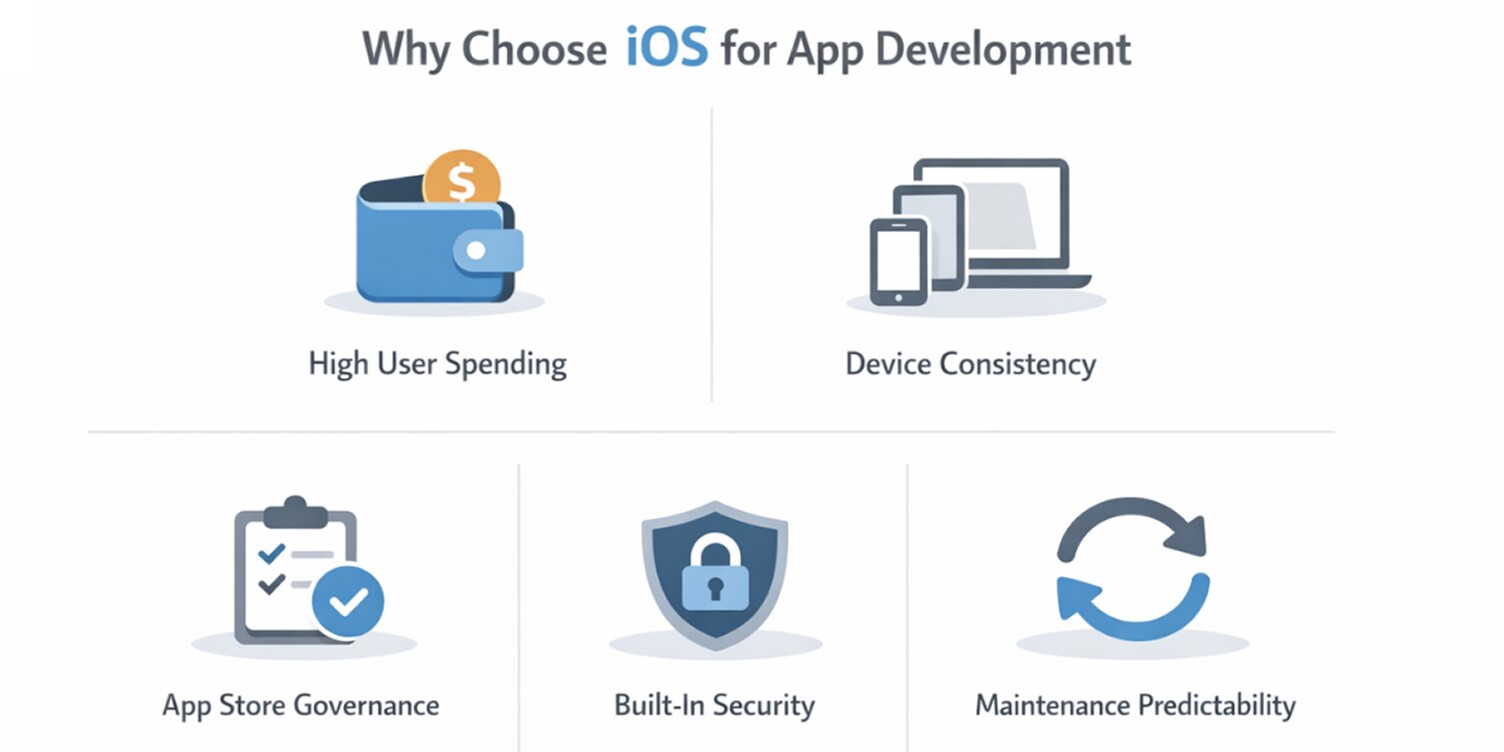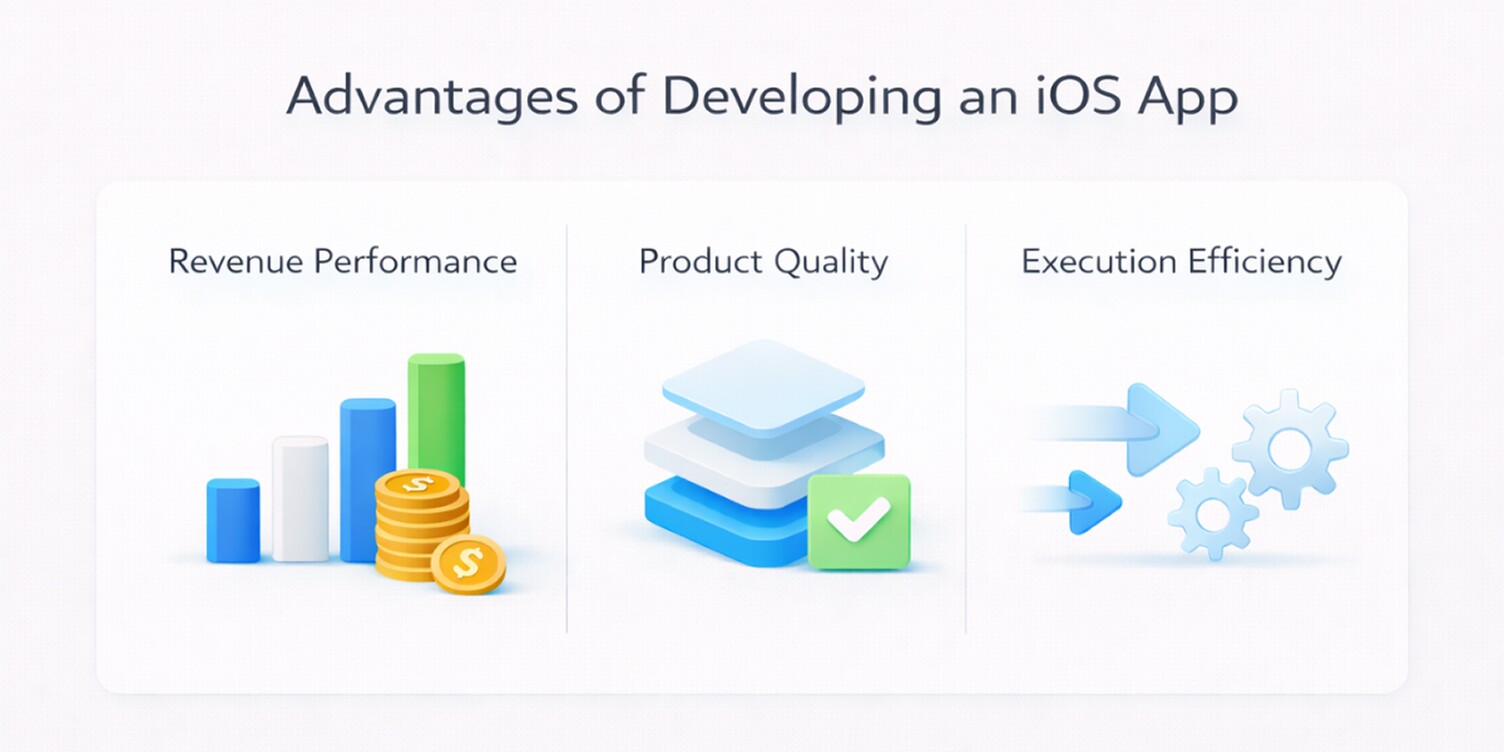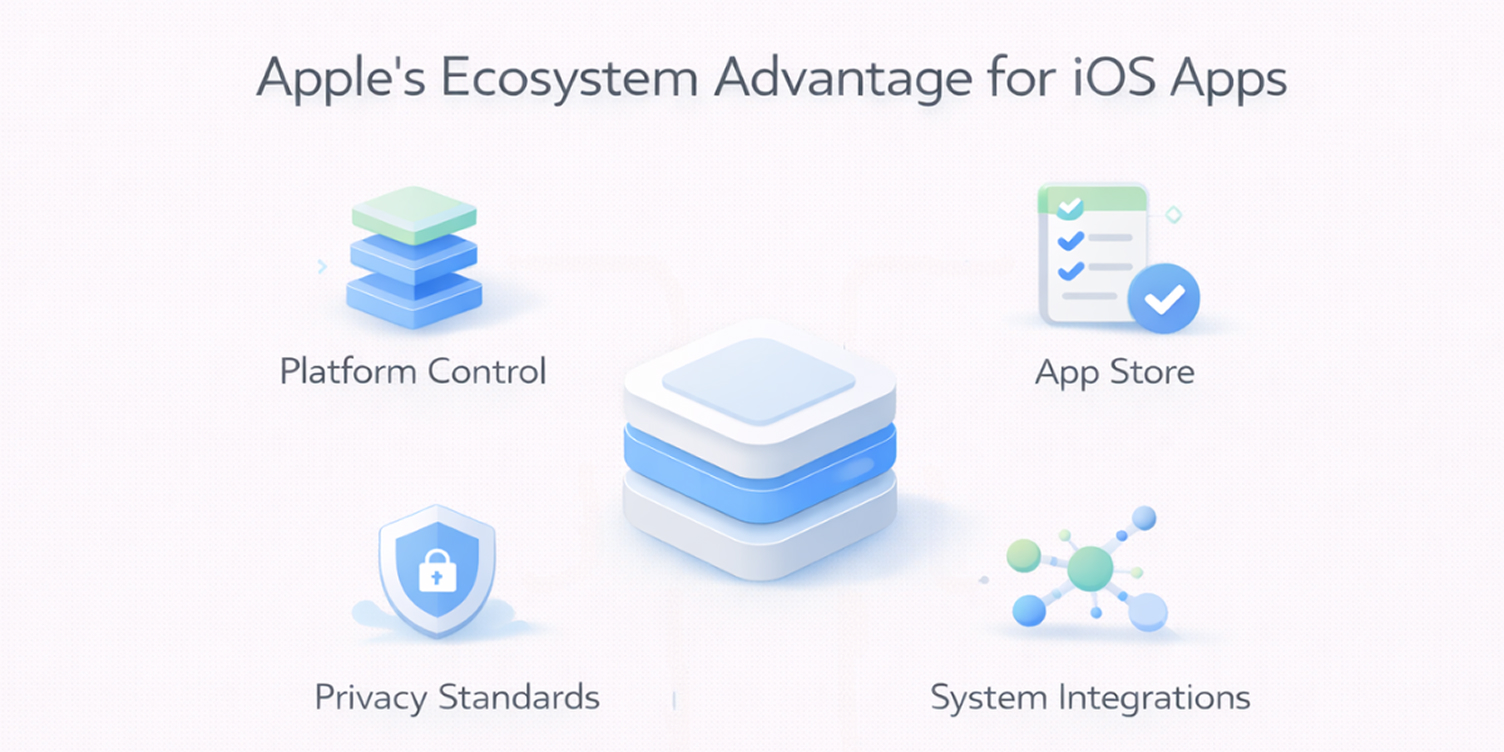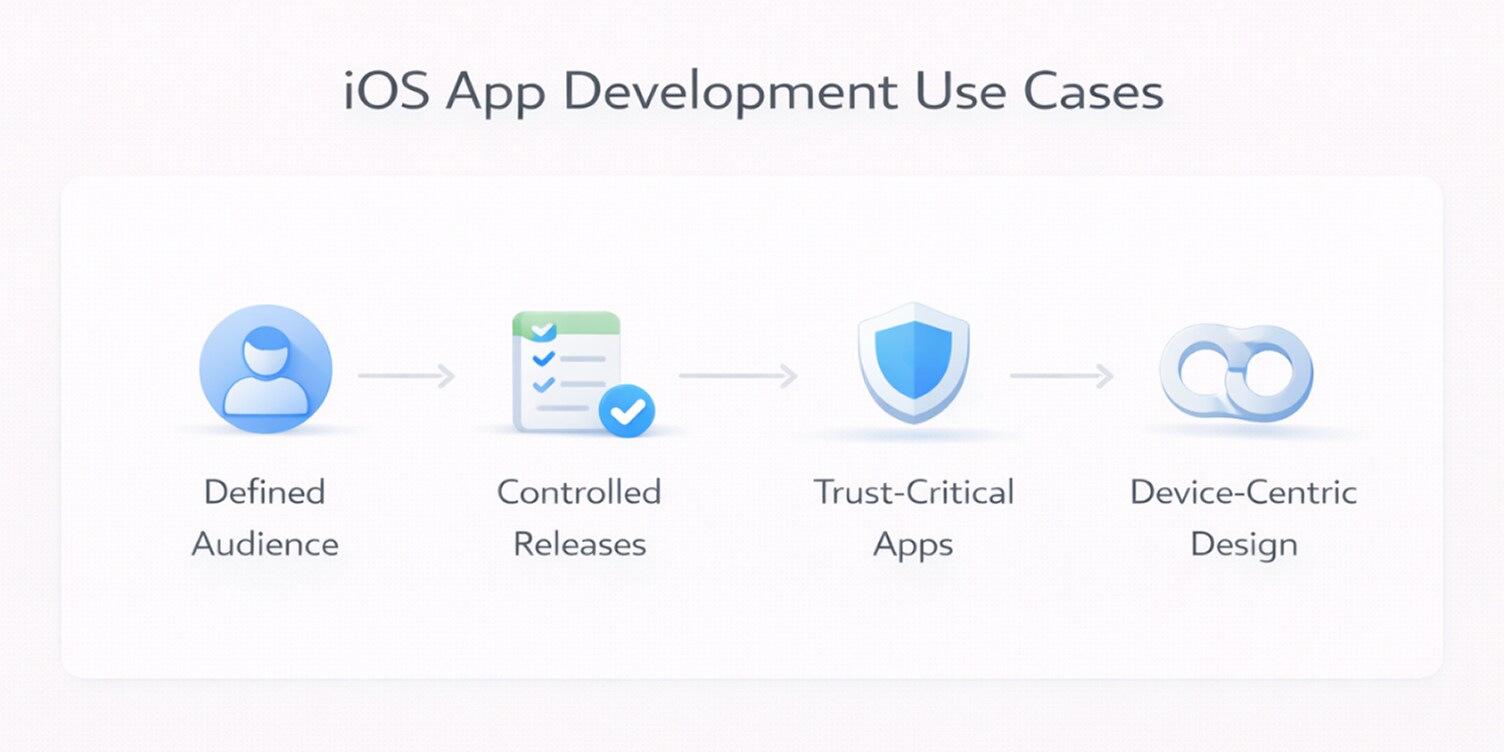iOS App Development Advantages What Makes It a Strong Platform Choice
Choosing a mobile platform affects far more than development effort. It influences how users engage, how revenue is generated, and how predictable long-term maintenance will be. For many teams, the challenge isn’t whether to build an app, but whether iOS offers advantages that justify prioritizing it over other platforms.
Apple’s App Store continues to lead in monetization. According to Statista, global consumer spending on the App Store exceeded $100 billion in 2023, even though iOS has a smaller global user base than Android. This gap highlights a consistent pattern in user behavior that directly impacts business models and product strategy.
This article breaks down the advantages of iOS app development, the trade-offs you should weigh, how iOS compares with other platforms, and when choosing iOS makes sense for your business and product goals.
Key Advantages of Choosing iOS App Development

Choosing iOS app solutions is a business decision that directly affects revenue models, operating effort, and long-term product stability. Companies evaluate iOS when they want clarity around how their app will perform in the market, how predictable development and maintenance will be, and how the platform supports sustainable growth.
User spending
iOS users are more likely to pay for apps, subscriptions, and in-app features. This directly influences app monetization models, pricing decisions, and how quickly revenue assumptions can be tested. For businesses focused on lifetime value rather than download volume, this behavior is a core advantage of iOS.
Device consistency
The Apple iOS platform runs on a limited, controlled set of devices, with rapid adoption of new OS versions. This reduces fragmentation, lowers testing effort, and makes it easier to support iOS applications without maintaining multiple legacy paths, especially when compared to the fragmentation challenges discussed in iOS vs Android app development decisions.
App Store governance
iOS app distribution is handled through the Apple App Store under a single set of review guidelines. These guidelines define expectations around performance, security, payments, and privacy. While approvals are required, this structure creates clearer operational standards and reduces uncertainty around compliance
Built-in security
Security and privacy are enforced at the platform level through strict permission controls and data protection mechanisms. For iOS application development involving sensitive or regulated data, this reduces reliance on custom safeguards and lowers overall risk exposure.
Most iOS apps also rely on backend services for storage and authentication, making cloud security considerations a natural extension of Apple’s on-device protections.
Maintenance predictability
Apple follows a consistent release cycle, typically with one major OS update each year. This allows teams to plan updates, testing, and long-term iOS app maintenance more reliably, rather than reacting to frequent platform changes, which is an important factor when assessing the overall cost of maintaining a mobile application.
Taken together, these considerations clarify why iOS is chosen in scenarios where revenue reliability, platform stability, and operational clarity outweigh the need for maximum reach. The following section breaks down the specific advantages that result from these characteristics.
Strengths That Define iOS App Development

Once iOS is being seriously evaluated, the question becomes whether the platform offers advantages that materially improve business outcomes. The value of iOS app development is most clearly seen across three areas that decision-makers care about revenue performance, product quality, and execution efficiency.
Revenue and market performance
Clearer monetization paths
iOS supports paid apps, subscriptions, and in-app purchases as first-class models. These mechanisms are familiar to users and tightly integrated into the App Store, which reduces friction during purchase. For businesses, this makes pricing strategies easier to test and revenue behavior more predictable compared to platforms that rely heavily on ads or indirect monetization.
Higher revenue per user
iOS users tend to generate more value over time, even when total install numbers are lower. This allows teams to focus on customer lifetime value rather than maximizing downloads, a pattern that becomes especially clear when evaluating the cost profile of trading apps, where fewer users can still support strong revenue outcomes.
Product quality and user experience
Consistent behavior across devices
iOS applications run within a tightly controlled hardware and software environment. This consistency reduces unexpected performance issues and visual inconsistencies, making it easier to deliver a stable experience across supported devices without excessive customization.
Built-in trust signals
App Store review standards, privacy disclosures, and permission controls influence how users perceive iOS apps. Users are more accustomed to granting permissions, completing payments, and storing sensitive data within iOS applications, which supports engagement and reduces drop-off in critical flows.
Faster access to platform improvements
New iOS releases are adopted quickly by users, allowing teams to rely on modern APIs and system features sooner. This reduces the need to support outdated versions and helps applications stay aligned with current user expectations around performance, accessibility, and security.
Execution and long-term efficiency
Lower testing overhead
A limited range of devices and faster OS adoption significantly reduce the scope of quality assurance. Teams spend less time validating edge cases across fragmented environments and more time improving core functionality, which can shorten release cycles.
More predictable maintenance effort
Apple’s structured release cadence makes it easier to plan updates and allocate resources over time. Instead of reacting to frequent platform changes, teams can align maintenance work with known update windows, reducing operational disruption and unplanned costs.
These advantages explain why iOS app development is often associated with stronger monetization, higher product reliability, and more controlled execution factors that become increasingly important as applications grow and mature.
How the Apple iOS Ecosystem Influences App Lifecycle

Beyond individual platform features, iOS app development is shaped by how Apple designs and governs its ecosystem. This ecosystem-level control affects how apps are built, distributed, maintained, and trusted over time. For many businesses, these structural factors influence risk, quality, and long-term sustainability more than any single technical capability.
Platform Control
Apple designs the hardware, operating system, and core services that iOS applications depend on. This minimizes differences across devices and OS versions, making app behavior more consistent in real-world use. For teams, this means fewer platform-specific issues and clearer expectations for compatibility and performance, which, in turn, support more predictable cloud architecture planning.
App Store distribution
All iOS applications are published and maintained through the Apple App Store. Updates, payments, subscriptions, and compliance flow through one channel with defined rules. While this introduces review requirements, it also provides a consistent and transparent framework for app distribution and lifecycle management.
Quality and privacy standards
App Store review guidelines enforce baseline expectations around performance, data handling, and user transparency. These standards limit practices that can degrade user experience or trust. For businesses, this creates a shared quality floor across the ecosystem, reducing reputational risk and supporting long-term user confidence.
Ecosystem integrations
iOS apps can integrate directly with Apple-managed services such as iCloud, Sign in with Apple, notifications, and system-level security features. Because these services are maintained by Apple, they reduce dependency on third-party tools and lower the ongoing effort required to keep integrations stable.
Predictable ecosystem evolution
Apple introduces platform changes through structured OS releases and clearly communicated deprecations. This gives teams advance visibility into upcoming requirements and sufficient time to adapt, making roadmap planning and long-term maintenance more manageable.
Together, these ecosystem characteristics explain why iOS is often viewed as a controlled environment designed to prioritize stability, trust, and consistency. Understanding this ecosystem context helps clarify how the advantages discussed earlier are sustained as an app grows and matures.
Trade-offs and Limitations of iOS App Development
After understanding how iOS and Apple’s ecosystem create stability and consistency, it’s equally important to examine the constraints that come with that model. These trade-offs influence how quickly teams can move, how much flexibility they retain, and how easily a product can evolve.
Key trade-offs to consider
How these trade-offs affect different decisions
These trade-offs become relevant when teams move from evaluation to execution. The points below highlight where iOS constraints typically shape timelines, budgets, and platform choices.
Speed and iteration
App Store reviews and platform policies can slow down rapid experimentation. Teams that rely on frequent releases or continuous feature testing may need to account for additional review cycles when planning timelines, especially compared with setups that emphasize faster iteration through automated mobile delivery pipelines
Cost and resourcing
iOS development often requires experienced developers and ongoing alignment with platform updates. While fragmentation is lower, the initial investment can be higher, which affects budgeting and return-on-investment calculations, particularly when compared with broader mobile development cost structures.
Flexibility and long-term options
Deep integration with Apple services simplifies development but increases dependency on the ecosystem. For products that may need to pivot platforms or adopt custom workflows later, this dependency should be evaluated carefully.
These limitations don’t make iOS a weaker platform, but they do shape the conditions under which it works best. Teams that value control, predictable operations, and long-term clarity often accept these constraints, while those prioritizing speed, flexibility, or broad experimentation may need to weigh them more carefully.
iOS vs Android App Development
When choosing between iOS and Android for app development, the decision often comes down to trade-offs rather than features. Both platforms are mature, widely used, and capable, but they support different priorities in terms of monetization, reach, consistency, and long-term maintenance.
What these differences mean in practice
The differences outlined above tend to surface gradually rather than at launch. Their impact becomes clearer as products scale, monetization stabilizes, and maintenance effort accumulates over time. For many teams, these outcome-level signals matter more than initial development considerations.
Revenue behavior
iOS app development often supports more predictable revenue patterns, particularly for products built around subscriptions or paid features. User willingness to pay, combined with standardized billing flows, allows teams to focus on retention and lifetime value rather than volume-driven monetization tactics.
Operational efficiency
Faster OS adoption and a controlled device ecosystem reduce variability across user environments. Over time, this lowers the effort required for testing, support, and compatibility work, allowing teams to spend more resources on product improvements instead of platform adjustments.
Product longevity
The iOS platform favors consistency and forward compatibility. Products that evolve steadily, rather than pivot frequently, often benefit from this stability, as long-term maintenance and feature expansion tend to be more predictable within Apple’s ecosystem.
These outcome-level effects help explain why iOS aligns more naturally with certain product strategies. Looking at how these advantages play out in real-world scenarios provides further clarity on when iOS app development is the right choice.
Business Use Cases for iOS App Development

iOS app development is often discussed in terms of features or industries, but those lenses rarely explain why the platform succeeds or fails in real products. In practice, platform fit becomes clear only after launch, when release discipline, operational responsibility, and day-to-day usage begin to shape the product.
The use cases below are framed around those realities, focusing on how applications are expected to behave and be managed over time rather than how they are positioned on paper.
Defined audience
iOS app development is commonly chosen when the target audience is already well understood, by behavior, geography, or usage pattern. In these situations, teams are not optimizing for maximum reach, but for relevance and consistency. The platform works well when the product is designed around a known user segment rather than broad, device-agnostic distribution.
Controlled releases
Some products operate under conditions where changes are planned, reviewed, and deliberately released. This includes applications tied to regulated workflows, enterprise environments, or coordinated product launches. Teams in these scenarios often favor iOS because it supports controlled versioning, predictable update paths, and clear ownership over what reaches end users and when.
Trust-critical apps
For certain applications, trust is not an outcome; it is a prerequisite. These are products where users must feel confident about how the app behaves, how updates are handled, and how access is managed. iOS is frequently chosen in these cases because it offers a clearly governed distribution and operating environment that reduces ambiguity once the app is in use.
Device-centric design
iOS app development is often selected when the product experience is tightly coupled to the smartphone. These applications are designed with the assumption that device interaction, such as authentication, local data handling, or system-level behavior, is central to how the product works, not an optional enhancement.
Long-term ownership
When teams expect to maintain and evolve an application over several years, operational clarity becomes critical. iOS is commonly chosen in scenarios where minimizing fragmentation, support variability, and update uncertainty is more important than retaining maximum platform flexibility. This is especially relevant for products with dedicated ownership and long-term support commitments.
Taken together, these use cases show that iOS app development is less about broad applicability and more about fit. The platform tends to work best when product expectations, operational discipline, and long-term ownership are already clear. Once those conditions are met, the decision to build on iOS becomes easier to justify and easier to sustain, over time.
iOS App Cost, Timeline, and Maintenance
Once the platform decision is made, the real challenge shifts to planning execution. iOS app costs and timelines are shaped by how clearly the scope is defined, how much customization is required, and how the product will be supported after launch. The ranges below are intended to help teams think in terms of scale and trade-offs, rather than exact estimates.
Cost and timeline by application scope
Factors that increase development effort
Cost variation within the same scope category is often driven by specific functional and operational choices. These elements do not always change what the app does at a high level, but they materially affect development effort.
Common cost amplifiers include:
- Premium integrations, such as payment processing, analytics platforms, or third-party services that require custom handling
- Real-time features, including live data sync, messaging, or location-based updates
- Administrative interfaces, such as internal dashboards, moderation tools, or reporting views
- Complex onboarding and authentication flows, particularly those involving multiple user roles or external identity providers
These factors help explain why two apps with similar surface functionality can fall into very different cost ranges.
Ongoing maintenance and post-launch costs
After release, the cost of owning an iOS app becomes incremental rather than upfront. Ongoing effort is driven by platform updates, usage patterns, and the pace at which the product evolves. Planning for this early helps teams avoid treating maintenance as an unplanned expense.
Typical post-launch considerations include:
- Compatibility updates for new iOS versions and devices
- Bug fixes and performance improvements
- Dependency and integration updates
- Incremental feature enhancements
Teams plan to allocate 15–25% of the initial development cost per year for maintenance, depending on usage intensity and release frequency. In addition, iOS products incur standard platform-related costs, such as participation in the Apple Developer Program and applicable App Store commissions on digital transactions.
Regional cost variation
Hourly development rates vary widely across regions, which affects upfront cost calculations. However, total project investment is influenced just as much by coordination effort, communication overhead, and delivery consistency as by hourly pricing alone.
When considering regional rates, teams typically factor in:
- Time zone overlap and working hours
- Communication and documentation practices
- Experience with similar project scopes
- Team stability and long-term availability
- Impact on coordination and review cycles
Hourly development rates vary widely across regions, which affects upfront cost calculations. However, total project investment is influenced just as much by coordination effort, communication overhead, and delivery consistency as by hourly pricing alone.
Final Thoughts
iOS app development continues to make sense for products where monetization, stability, and long-term value matter. According to Sensor Tower, iOS generates around 60–65% of global consumer app revenue, despite having a smaller global device share than Android. This reflects stronger spending behavior on subscriptions and paid digital services, which directly influences return on investment for many businesses.
From a delivery and maintenance perspective, iOS also offers predictability. Based on Apple’s official iOS adoption data, supported by analysis from Business of Apps, more than 80% of active iPhones adopt the latest iOS version within the first year. Faster OS adoption reduces fragmentation, limits compatibility effort, and simplifies long-term support compared to slower-updating ecosystems.
In practice, iOS works best when chosen intentionally. Products with defined audiences, premium positioning, and long-term ownership plans tend to see the strongest outcomes. When those conditions are met, iOS remains a dependable platform for building and sustaining high-value mobile applications.
